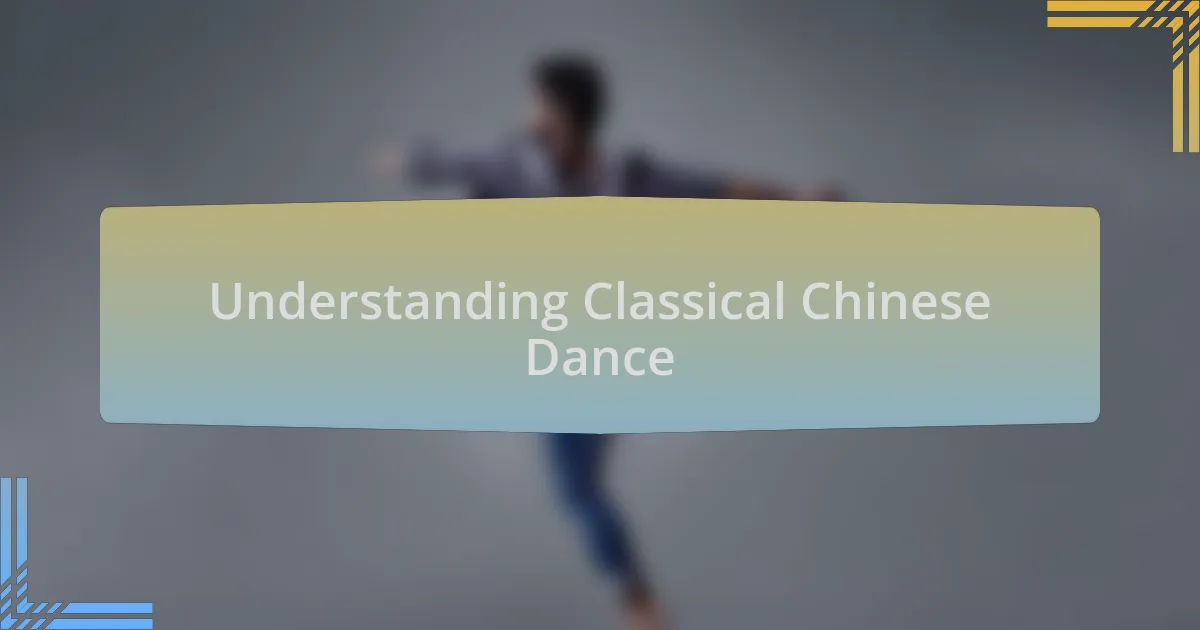Key takeaways:
- Classical Chinese Dance embodies deep cultural heritage, with meaningful movements that express emotions and historical narratives.
- Learning languages enhances cognitive abilities, fosters empathy, and allows for deeper cultural appreciation.
- The journey of learning languages is driven by personal curiosity, the desire to engage with the arts, and the thrill of overcoming challenges.
- Aspiration to achieve fluency in Mandarin reflects a desire to connect with a rich cultural tapestry and continue personal growth through language learning.

Understanding Classical Chinese Dance
Classical Chinese Dance is not just a form of artistic expression; it reflects centuries of cultural heritage and philosophy. When I first encountered this dance, I was captivated by the graceful movements and the intricate costumes that seemed to tell stories of love, nature, and history. Have you ever felt that rush of connection to a culture through its art? I did, and it opened my eyes to the depth behind every gesture.
The technique in Classical Chinese Dance involves more than just physical skill; it’s about embodying emotions and the essence of Chinese aesthetics. Each movement, whether a flowing hand gesture or a powerful leap, is imbued with meaning. I remember one particular performance where a dancer depicted a mythical phoenix. The way she expressed the bird’s rebirth through her movements left me in awe, reminding me that dance can be a transformative experience.
Understanding this dance form requires a willingness to immerse oneself in its context—historical, cultural, and spiritual. I often wonder how many people overlook the layers of meaning in each performance. After my initial exploration, I found myself researching historical background, from the dynasties that shaped it to the philosophies that inform its practice. It’s like peeling back the layers of an onion; each layer reveals something profound and beautiful about the human experience through movement.

Importance of Learning Languages
Learning languages has become essential in our increasingly interconnected world. From my own experience, I’ve found that being able to communicate in another language opens doors to new cultures and perspectives. Have you ever felt the joy of conversing with someone in their native tongue? It’s a wonderful feeling that fosters deeper connections and mutual understanding.
Beyond building relationships, learning languages enhances cognitive abilities. Personally, when I tackled the intricacies of a new language, I noticed improvements in my memory and problem-solving skills. It’s fascinating how the brain adapts; mastering vocabulary and grammar is like a workout for your mind. Have you ever felt a rush of accomplishment after finally grasping a challenging concept? That satisfaction is incredibly rewarding.
Moreover, language learning cultivates empathy and appreciation for diversity. In my journey, I’ve encountered countless stories that highlight the richness of different cultures. These narratives remind me of the beauty in our differences. Isn’t it interesting how a simple phrase in another language can capture the essence of an entire culture? Understanding various languages allows us to appreciate the world in a more profound way.

My Motivation for Learning Languages
Learning languages has been a deeply personal journey for me, driven by my love for exploring new cultures. Each time I attempted to speak in a different language, I felt an exhilarating mix of excitement and nervousness. Can you recall the first time you navigated through words and phrases that felt foreign, only to find that they connected you with someone on a whole new level? That thrill is what keeps me motivated.
In addition to cultural curiosity, I’ve always had a burning desire to engage with the arts in their original forms. There’s a unique beauty in understanding a piece of literature or music in the language it was created. I remember the first time I read a poem in Spanish; it was as if the words danced in a rhythm I hadn’t experienced before. Don’t you think it’s incredible how language can add layers of meaning to art?
Moreover, the challenge of mastering a new language speaks to my competitive spirit. I thrive on setting goals, and language learning provides a measurable path to personal growth. After completing my first language course, I felt a surge of pride, as if I’d conquered a mountain. Isn’t it inspiring how these obstacles can transform into milestones in our lives? This ongoing process of learning fuels my passion and commitment to languages.

My Progress and Future Goals
My journey in learning languages has seen steady progress, marked by both successes and setbacks. I still vividly remember the moment I successfully held a conversation in French for the first time; it felt like unlocking a door to a vibrant world. Have you ever experienced that sense of accomplishment that sweeps over you when you realize you’re not just repeating words, but genuinely communicating with someone?
Moving forward, my goals are more ambitious than ever. I aspire to achieve fluency in Mandarin, as I see it as a gateway to understanding not just a language, but a rich tapestry of culture and history. Sometimes I wonder how mastering this language will change the way I connect with others. What stories will I uncover as I dive deeper into conversations that were once out of reach?
Reflecting on my experiences, I know that every mistake I’ve made has been a stepping stone towards proficiency. For instance, I stumbled over tones in Mandarin frequently, but instead of discouragement, I found humor in my blunders. As I set my sights on the next chapter of my language-learning journey, I’m excited about the possibilities that lie ahead—what new connections and insights await me as I continue to break down language barriers?